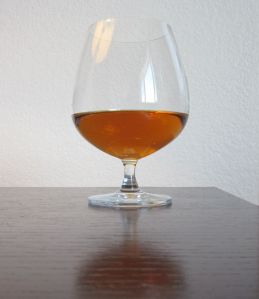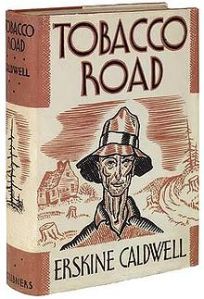The Drink
Please observe the following procedure:
1. Select in May six of your finest McIntosh trees and place a hive of bees under each tree to insure the ‘setting’ of the blossoms.
2. Visit your trees with a spray gun once a month until October, and see to it that not an insect remains alive.
3. About the middle of October gather by hand four bushels of the finest ‘Reds,” selecting each apple for color, size and ripeness.
4. When these are ready to put into the hopper of your cider mill, go back to the orchard and pick up two pecks of windfalls from the ground, carefully selecting the most decayed, wormiest and snail encrusted.
5. Mix the two gatherings and grind and press.
6. For three days and nights drink the sweetest cider you have ever tasted, noting that no matter how much you drink, you can always find room for a little more.
7. On the fourth day you will discover that you have the hardest drink that ever blew a bunghole.-from So Red the Nose
Although I try to be faithful to the original So Red the Nose drinks, sometimes modern modifications need to be made. Here’s my updated, 2014 version of Tobacco Road cocktail:
1. Go to Big Box Liquor Store
2. Ask BBLS employee for applejack
3. Sulk for three months because employee looked at you like you were speaking Chinese.
4. Attempt to special order applejack from Online Specialty Liquor Store.
5. Call OSLS and ask for a refund after your order was sent to Florida.
6. Put in a special order at Competing Big Box Liquor Store. Settle in for a long wait.
7. Realize that CBBLS had it in stock all along. Pick it up the next day.
Conclusion: If unlike Erskine Caldwell, you do not have your own apple orchard, then you can buy applejack brandy from Bevmo. As far as I can tell, Laird’s is the only the only brand name that still exists.
Applejack brandy was apparently one of those liquors popular in the past that has since fallen out of favor, as it’s mentioned several times in SRTN. Wikipedia claims it is an American tradition going back to colonial times, and it definitely has a festive, Thangivingy feel.
The brandy you’re most likely familiar with is made from refermenting wine; applejack brandy is made from refermenting apple cider. It is indeed quite delicious although I was disappointed by the lack of a strong apple flavor. Applejack is significantly lighter than, say, a cognac and — to my inexpert palate– smoother and even easier to drink.
The Book
Jeeter was now reduced to painful poverty. His means of livelihood had been taken away, and he was slowly starving.
-From Tobacco Road
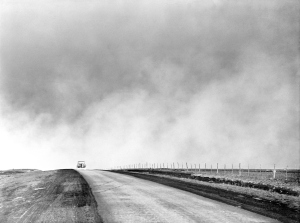 I am only just over a quarter of the way through the SRTN books, but I still feel completely confident in saying that Erskine Caldwell’s Tobacco Road is the most shocking and disturbing of the whole lot. And I don’t mean like shocking for those unenlightened times, Victorian women showing their ankles and Elvis dancing with his hips kind of shocking. I mean that this book’s first scene is a teenage girl openly masturbating in front her mother, father, and mentally handicapped brother. I mean that there are not one, but two child rapes, a family intentionally starving their grandmother to death, and a racially-motivated hit-and-run scene too horrific to summarize in one-third of a sentence.
I am only just over a quarter of the way through the SRTN books, but I still feel completely confident in saying that Erskine Caldwell’s Tobacco Road is the most shocking and disturbing of the whole lot. And I don’t mean like shocking for those unenlightened times, Victorian women showing their ankles and Elvis dancing with his hips kind of shocking. I mean that this book’s first scene is a teenage girl openly masturbating in front her mother, father, and mentally handicapped brother. I mean that there are not one, but two child rapes, a family intentionally starving their grandmother to death, and a racially-motivated hit-and-run scene too horrific to summarize in one-third of a sentence.
Yeah.
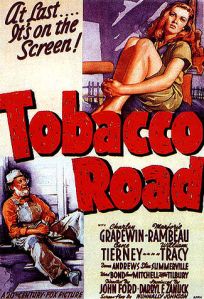
The 1941 film version was heavily sanitized, especially as compared to the popular and intentionally provocative Broadway production. Said direct John Ford, “We have no dirt in the picture. We’ve eliminated the horrible details and what we’ve got left is a nice dramatic story. What we’re aiming at is to have the customers sympathize with our people and not feel disgusted.” Oh Hollywood. Also, I literally lol’d at the casting of Gene Tierney as the harelipped daughter.
Tobacco Road is our first Great Depression-themed novel, which is surprising considering that SRTN was written a good six years after the Great Crash. It’s funny how art is often so behind its own times.
Anyway, the novel follows the Lesters, a family who has farmed for three generations on the edge of the eponymous a road, an area hit hard by the Dust Bowl. The first third or so of the story reminds me a bit of Chekhovian tragicomedy: nothing of consequence really happens except a constant repetition of mundane gestures (Ma hugs her shawl tighter; Pa props of the tires of his ancient car) which are heavy with SYMBOLISM.
You might think that sounds boring, and you would be correct. But just as the story begins to lose your interest, Caldwell has them do something like sell their 12-year-old daughter for seven dollars and a blanket. So it has a way of holding your attention.
This book stands out from other Depression books (ok, book. I read Grapes of Wrath in high school) in its sheer ruthlessness. The Lesters are no worthy poor, proud and hard-working, dignified in their suffering. Rather, they are completely depraved, brutal in their callousness. They are an inverse of Tom and Daisy. They carelessly smash up people and things, but with no wealth to retreat back into, they instead wallow in their poverty, their hopelessness, and their self-pity. The reader is shocked not by the evil things they do, but by the completely heartless way they react (or rather, don’t react) to the consequences.
Example: the youngest son “Dude” (yes, really) kills a man in a hit and run and his father, Jeeter, barely shifts his position on the porch. “Niggers will get killed. Looks like there ain’t no way to stop it.”
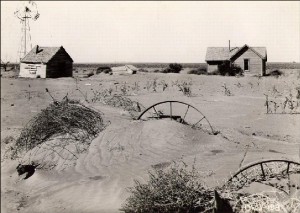 Similarly, Dude later hits his grandmother with the same car (There’s a pattern here. The car is another SYMBOL). Jeeter comments, “She ain’t stiff yet, but I don’t reckon she’ll live…I’ll dig a ditch to put her in.” Actually, this response is relatively compassionate, considering Jeeter has been actively trying to kill his mother since the first chapter.
Similarly, Dude later hits his grandmother with the same car (There’s a pattern here. The car is another SYMBOL). Jeeter comments, “She ain’t stiff yet, but I don’t reckon she’ll live…I’ll dig a ditch to put her in.” Actually, this response is relatively compassionate, considering Jeeter has been actively trying to kill his mother since the first chapter.
Forgotten Classic or Better Left in the Past?
Or, Why Tobacco Road > The Grapes of Wrath
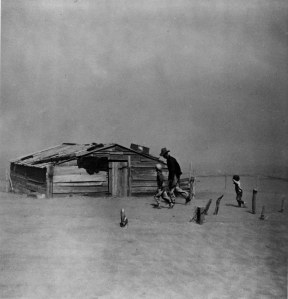 I say the following without contradicting anything I have said so far in this review: Tobacco Road is a great novel.
I say the following without contradicting anything I have said so far in this review: Tobacco Road is a great novel.
Starvation stories should be brutal. People wasting away in hunger and disease in my own home country, within living memory is a shocking thing and I should be shocked by it. Tobacco Road actually reminds me much more of a lawless, chaotic, post-apocalyptic story than historical fiction. And I liked that. It forced me to reconsider the Great Depression within that miserable framework. Although it is impossible to like or even sympathize with the amoral Lesters, their story makes you question what morality even means for people whose bodies are literally falling apart while they are still alive in them (Google pellegra).
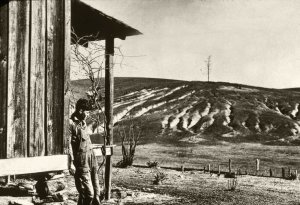 Caldwell does try to redeem Jeeter — kind of. It’s hard to tell honestly. He does do the whole farmer-whose-one-passion-is-this-earth-and-love-for-the-land thing, but it falls pretty flat after all that effort in making Jeeter both an irrevocably despicable person and an irresponsible layabout. Yet even as the Lesters are completely horrible human beings, they are also victims, both of society in general and of the Mr. Potteresque Captain Harmon, who is clearly exploiting all his share crop…-ees.
Caldwell does try to redeem Jeeter — kind of. It’s hard to tell honestly. He does do the whole farmer-whose-one-passion-is-this-earth-and-love-for-the-land thing, but it falls pretty flat after all that effort in making Jeeter both an irrevocably despicable person and an irresponsible layabout. Yet even as the Lesters are completely horrible human beings, they are also victims, both of society in general and of the Mr. Potteresque Captain Harmon, who is clearly exploiting all his share crop…-ees.
The book also gives a microscopic bit of hope in the form of all but two of the Lester children, who Caldwell very passingly suggests rejected their father’s ways and escaped to a larger city. Again though, it’s kind of hard to tell when everything is told from Jeeter’s very unreliable point of view.
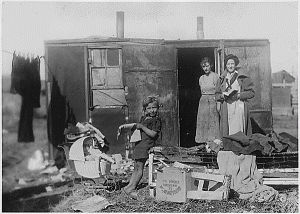 My library has about ten copies of this book, which I originally took to mean it must be taught somewhere. Having read it now though…I highly doubt it, at least at the high school level. It’s easy to see why The Grapes of Wrath became the standard answer to the “What do we read concurrently with history’s Depression unit?” question, even though the books are about equal in terms of critical acclaim. Steinbeck’s novel is more hopeful, more positive, preachier, more cliched, more self-righteous…you see where I’m going with this. Caldwell’s lack of message is his book’s strength. If your goal is to vividly expose students to the Great Depression, or even just to the depth human suffering and depravity, Tobacco Road is the better book.
My library has about ten copies of this book, which I originally took to mean it must be taught somewhere. Having read it now though…I highly doubt it, at least at the high school level. It’s easy to see why The Grapes of Wrath became the standard answer to the “What do we read concurrently with history’s Depression unit?” question, even though the books are about equal in terms of critical acclaim. Steinbeck’s novel is more hopeful, more positive, preachier, more cliched, more self-righteous…you see where I’m going with this. Caldwell’s lack of message is his book’s strength. If your goal is to vividly expose students to the Great Depression, or even just to the depth human suffering and depravity, Tobacco Road is the better book.
But, yeah, that will never happen because the weird sex stuff in The Grapes of Wrath is at least not violently weird. School administrators don’t really count Steinbeck’s date-rapey preacher.
Anyway, Tobacco Road: if nothing else, you can say you have read one of the most censored books of the 1930’s.
Tobacco Road is available wherever books are sold, lent, or left out on the curb. You can purchase it here.
Next time: Frank Scully teaches us how to have Fun in Bed. I bet alcohol is involved somehow.
